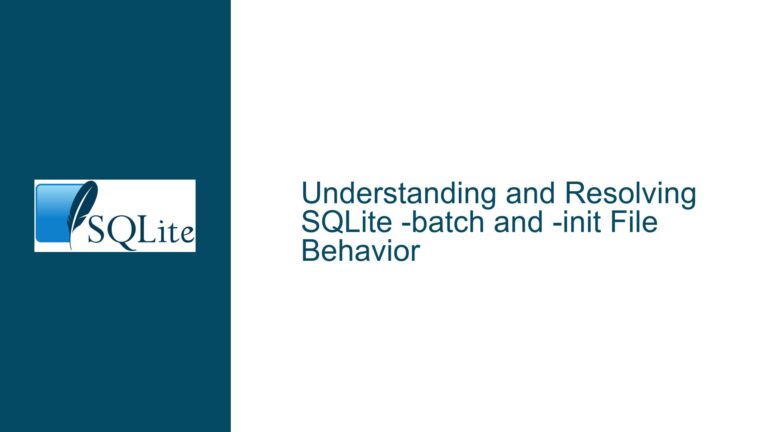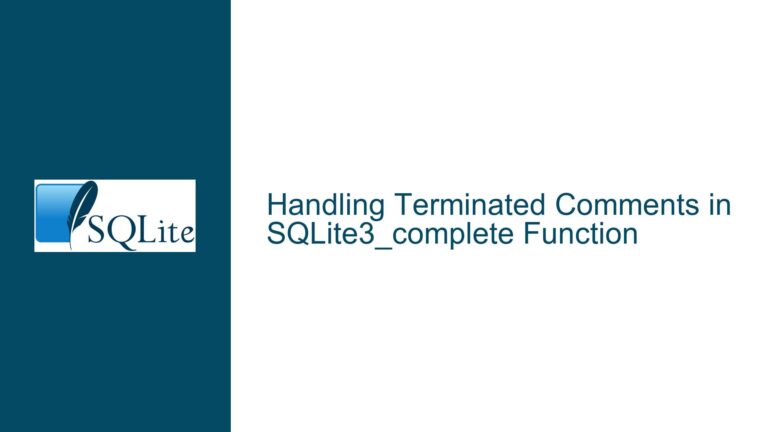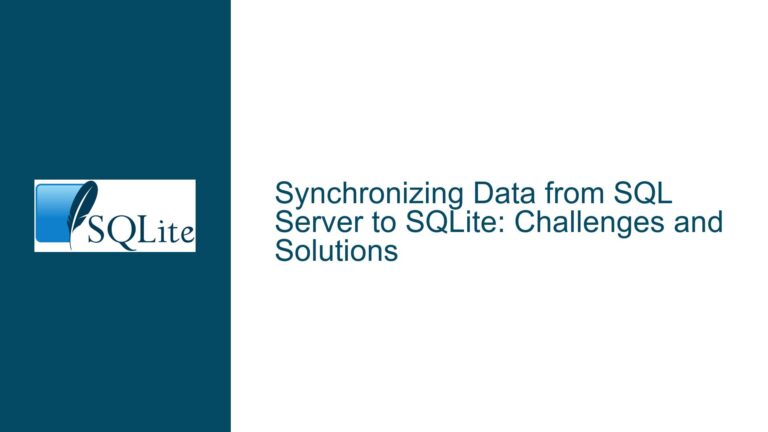Enhancing SQLite Virtual Tables: Features, Challenges, and Solutions
Incremental Blob I/O and Advanced Query Optimization in Virtual Tables
SQLite virtual tables are a powerful feature that allows developers to create custom table-like structures backed by user-defined logic. However, the current implementation has limitations, particularly when dealing with large binary objects (BLOBs), complex query optimizations, and advanced indexing scenarios. One of the most pressing issues is the lack of incremental blob I/O support, which can lead to performance bottlenecks when handling large datasets. Additionally, the inability to fully consume LIMIT and OFFSET clauses, along with the absence of batch updates and expression-based indexing, restricts the flexibility and efficiency of virtual tables.
The colUsed field in the sqlite3_index_info structure is another area of concern. It often specifies more columns than necessary, leading to inefficiencies in query planning. Furthermore, the absence of SQLITE_INDEX_CONSTRAINT_TRUE and SQLITE_INDEX_CONSTRAINT_FALSE constraints limits the ability to optimize queries involving complex expressions. These limitations collectively hinder the full potential of virtual tables, especially in scenarios requiring advanced query optimization and efficient data handling.
Interrupted Write Operations and Missing Upsert Support
One of the critical challenges with virtual tables is the lack of support for upsert operations. Upsert, a combination of update and insert, is a common requirement in many applications, particularly when dealing with concurrent data modifications. The absence of this feature in virtual tables forces developers to implement custom logic, which can be error-prone and inefficient. Additionally, the current implementation does not provide a mechanism to handle interrupted write operations gracefully, which can lead to data inconsistencies and corruption.
The sqlite3_vtab_config function could be extended to enable upsert support, but this would require careful consideration of compatibility and performance implications. The xUpdate method in the virtual table module would need to be enhanced to return specific error codes, such as SQLITE_CONSTRAINT_PRIMARYKEY or SQLITE_CONSTRAINT_ROWID, to trigger the upsert logic. This enhancement would significantly improve the robustness and usability of virtual tables in real-world applications.
Implementing PRAGMA journal_mode and Advanced Indexing Techniques
To address these challenges, several solutions can be implemented. First, incremental blob I/O support can be added by introducing new methods such as xBlobOpen, xBlobClose, xBlobRead, and xBlobWrite. These methods would allow virtual tables to handle large BLOBs more efficiently, reducing memory usage and improving performance. Additionally, the LIMIT and OFFSET clauses can be consumed more effectively by enhancing the query optimization logic in the virtual table module.
Batch updates can be implemented by extending the sqlite3_index_info structure with additional fields to support bulk operations. This would allow virtual tables to process multiple rows in a single operation, reducing the overhead associated with individual row updates. The colUsed field can be optimized by introducing a mechanism to distinguish between columns that are essential for query execution and those that are not. This would improve query planning and reduce unnecessary data processing.
Expression-based indexing can be supported by introducing new constraint types, such as SQLITE_INDEX_CONSTRAINT_TRUE and SQLITE_INDEX_CONSTRAINT_FALSE. These constraints would enable virtual tables to optimize queries involving complex expressions, such as ORDER BY RANDOM() LIMIT 1. Finally, upsert support can be added by extending the sqlite3_vtab_config function and enhancing the xUpdate method to handle primary key and rowid constraints more effectively.
Detailed Implementation Steps
Incremental Blob I/O Support:
- Introduce new methods
xBlobOpen,xBlobClose,xBlobRead, andxBlobWritein the virtual table module. - Modify the query planner to recognize and utilize these methods for handling large BLOBs.
- Update the documentation to reflect the new methods and their usage.
- Introduce new methods
Consuming
LIMITandOFFSETClauses:- Enhance the query optimization logic to fully consume
LIMITandOFFSETclauses. - Ensure that the
ORDER BYclause is consumed before applyingLIMITandOFFSET. - Update the virtual table module to support these optimizations.
- Enhance the query optimization logic to fully consume
Batch Updates:
- Extend the
sqlite3_index_infostructure with additional fields to support batch updates. - Modify the
xUpdatemethod to handle bulk operations efficiently. - Update the documentation to include examples of batch updates in virtual tables.
- Extend the
Optimizing the
colUsedField:- Introduce a mechanism to distinguish between essential and non-essential columns in the
colUsedfield. - Modify the query planner to utilize this information for more efficient query execution.
- Update the documentation to explain the new optimization techniques.
- Introduce a mechanism to distinguish between essential and non-essential columns in the
Expression-Based Indexing:
- Introduce new constraint types
SQLITE_INDEX_CONSTRAINT_TRUEandSQLITE_INDEX_CONSTRAINT_FALSE. - Enhance the query planner to recognize and utilize these constraints for optimizing complex expressions.
- Update the documentation to include examples of expression-based indexing.
- Introduce new constraint types
Upsert Support:
- Extend the
sqlite3_vtab_configfunction to enable upsert support. - Modify the
xUpdatemethod to return specific error codes for primary key and rowid constraints. - Update the documentation to explain the new upsert functionality.
- Extend the
Performance Considerations
Implementing these enhancements requires careful consideration of performance implications. Incremental blob I/O support can significantly reduce memory usage, but it may introduce additional overhead for small BLOBs. Batch updates can improve performance for bulk operations, but they may require more complex error handling. Expression-based indexing can optimize complex queries, but it may increase the complexity of the query planner. Upsert support can improve data consistency, but it may introduce additional constraints on the virtual table implementation.
Compatibility and Backward Compatibility
Ensuring compatibility with existing virtual table implementations is crucial. The proposed enhancements should be designed to maintain backward compatibility wherever possible. For example, the new methods for incremental blob I/O can be optional, allowing existing virtual tables to continue functioning without modification. Similarly, the new constraint types for expression-based indexing can be introduced in a way that does not break existing queries.
Conclusion
Enhancing SQLite virtual tables with incremental blob I/O, advanced query optimization, batch updates, expression-based indexing, and upsert support can significantly improve their flexibility and efficiency. These enhancements address key limitations in the current implementation, enabling virtual tables to handle more complex scenarios and larger datasets more effectively. By carefully considering performance implications and ensuring backward compatibility, these enhancements can be implemented in a way that benefits both existing and new applications.
| Feature | Current Limitation | Proposed Enhancement | Performance Consideration |
|---|---|---|---|
| Incremental Blob I/O | Lack of support for large BLOBs | Introduce xBlobOpen, xBlobClose, etc. | Reduced memory usage, potential overhead |
LIMIT and OFFSET | Inefficient consumption | Enhance query optimization logic | Improved query performance |
| Batch Updates | No support for bulk operations | Extend sqlite3_index_info structure | Efficient bulk processing |
colUsed Field | Specifies more columns than necessary | Distinguish essential columns | Improved query planning |
| Expression-Based Indexing | Limited support for complex expressions | Introduce new constraint types | Optimized complex queries |
| Upsert Support | No support for upsert operations | Extend sqlite3_vtab_config function | Improved data consistency |
By addressing these issues and implementing the proposed solutions, SQLite virtual tables can become even more powerful and versatile, meeting the needs of modern applications that require efficient data handling and advanced query optimization.






